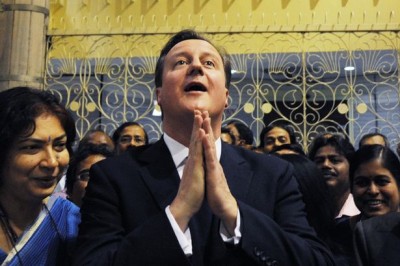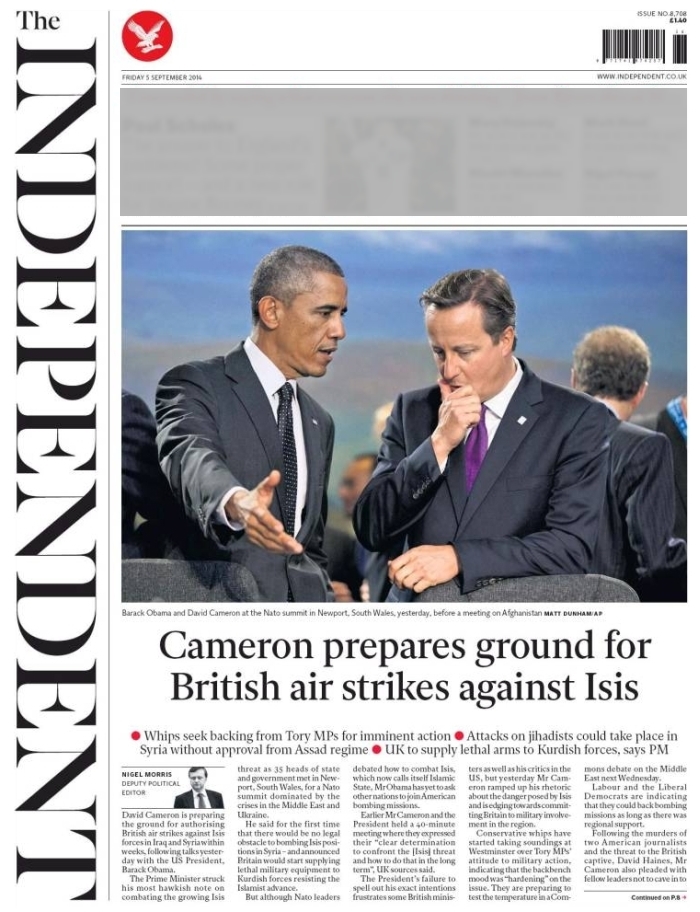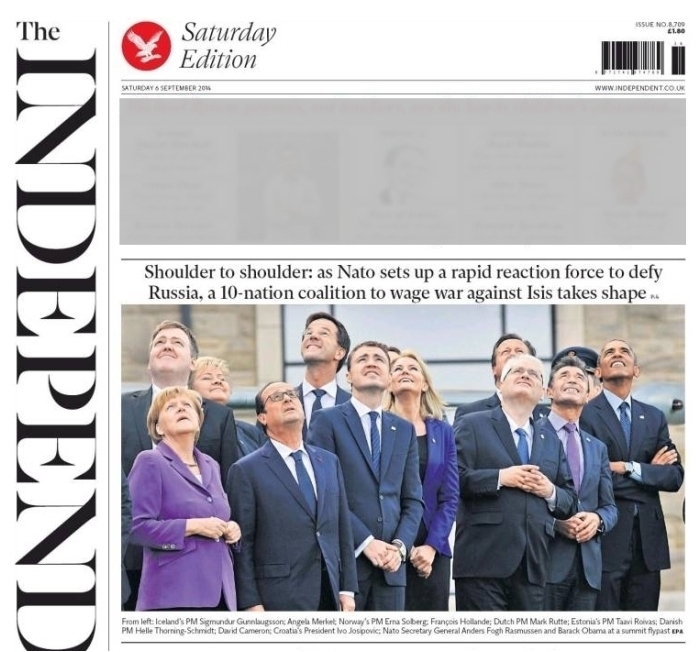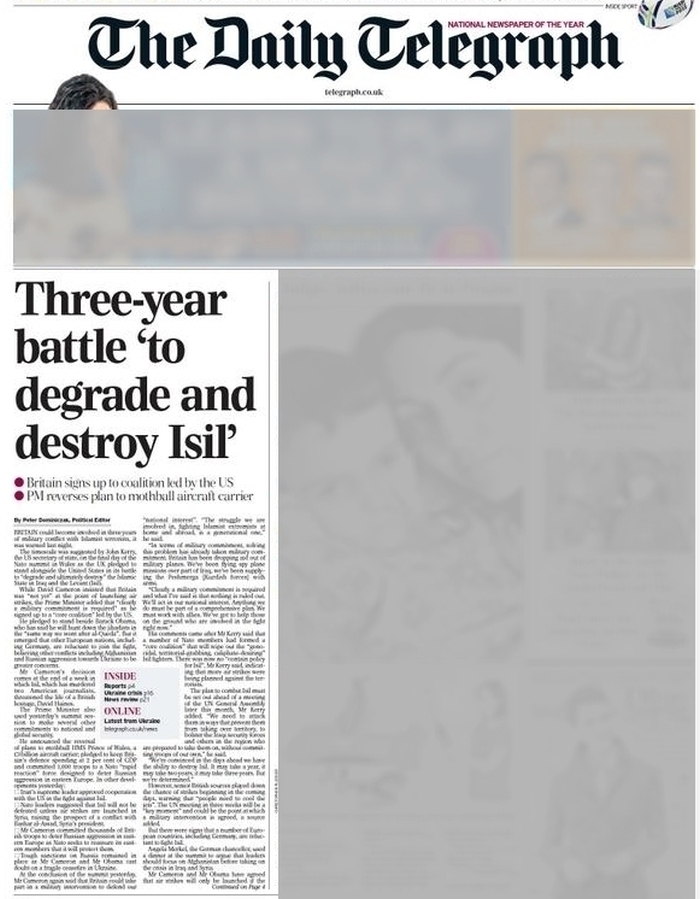British and US Attacks against ISIS: Obama and Cameron: “Air Strikes on Syria would be Legally Justified”

One wonders how British Prime Minister David Cameron would try to justify his patently criminal statements in front of a war crimes tribunal…
This is how the British press covers the issue of “Going After ISIS” as part of a “Global War on Terrorism”
BBC: Your former defence spokesman [sic] Liam Fox says that basically we should be joining the Americans in air strikes because it does help those on the ground. You damage supply lines with military power, you destroy bases; and whether that’s in Iraq or in Syria.
PRIME MINISTER CAMERON: Well, these are all things that should be considered. And we’ve supported the American air strikes up to now, which have been helping to make sure that the Kurds…
Scroll down for selected excerpts:
 The Independent, 5 September 2014
The Independent, 5 September 2014

The Independent, 6 September 2014
excerpt from: Shoulder to shoulder: as Nato sets up a rapid reaction force to defy Russia, a 10-nation coalition to wage war against Isis takes shape.
by Nigel Morris, The Independent, 6 September 2014

Daily Telegraph, 6 September 2014
______________________________________________________________________________________
excerpts from: Cameron: ‘I won’t rule anything out’ on action against IS
[excerpts transcribed by the author from the audio clip of British Prime Minister David Cameron’s interview with BBC Radio 4]
BBC Radio 4 website, 4 September 2014
[emphasis added]
BBC: Your former defence spokesman [sic] Liam Fox says that basically we should be joining the Americans in air strikes because it does help those on the ground. You damage supply lines with military power, you destroy bases; and whether that’s in Iraq or in Syria.
PRIME MINISTER CAMERON: Well, these are all things that should be considered. And we’ve supported the American air strikes up to now, which have been helping to make sure that the Kurds…
BBC: But are you actively considering sending British planes out to join these air strikes?
PRIME MINISTER CAMERON: As I’ve said, we are not ruling anything out. I think we shouldn’t underplay what Britain has done already. Our Tornado planes and Rivet Joint planes have been flying over this area to help gather information. We’re working with the Americans in what they’ve have done. […] It needs to be an entirely joined-up strategy, working with the regional partners, working with those on the ground. What I would call ‘the tough, long-term,intelligent approach’ rather than thinking there is some simple, single intervention that would make the difference.
BBC: And does that approach also mean having some sort of arrangement with President Assad in Syria so that whatever the ultimate plan is with him, that you are allowed the freedom to strike ISIS in Syria?
PRIME MINISTER CAMERON: My view is that President Assad is part of the problem rather than part of the solution. If you ask yourself how come Islamic State has managed to establish itself so quickly, part of the answer is Assad’s brutality in Syria gave credence to this group, while the other opposition groups, more democratic and pluralistic, didn’t perhaps get the support they needed. […]
BBC: OK, but you’ve got a difficulty here: […] in Syria you’ve got an air force that can react to you.
PRIME MINISTER CAMERON: The point of view I would take is that you’ve got to have a long-term view about what you think the right long-term answer is. And it’s the same in Iraq as it is in Syria, which is a democratic, pluralistic government that can look after all of the people in the country and not brutalize a section of them. And I think that sometimes in the past just saying ‘my enemy’s enemy is my friend’ has led us into all sorts of moral quagmires and difficulties.
BBC: But you’ve got practical hurdles then, serious practical hurdles to overcome […] At the moment you’ve got this ISIS, which many people would suggest is a greater threat to the whole region and to us than Assad is.
PRIME MINISTER CAMERON: […] What I am saying is that you’ve got to understand that Assad has been part of the creation of Islamic State rather than being part of its answer.
BBC: Indeed, but don’t we find ourselves in a strange situation where if Iraq asks for air strikes, they become legal, if Assad asks for air strikes then they become legal in Syria and if he doesn’t, it is illegal?
PRIME MINISTER CAMERON: I think if you want to talk pure legalities, I don’t think it’s that complicated because, obviously, the Iraqi government is a legitimate government, we believe it is about to become more legitimate with a new Prime Minister with the backing of all of his country; whereas President Assad has committed war crimes on his own people and therefore is illegitimate. So, I think if you want to get into the legalities, I do think there are two different…
BBC: OK, it is not the legality that is stopping any military action here. You feel, given the way people are behaving in the region, there would be moral and legal justification for doing something, for acting.
PRIME MINISTER CAMERON: Well, obviously we would never do anything unless there was moral and legal justification for doing something, that needs to be said.
BBC: That’s what I wondered, does it exist now?
PRIME MINISTER CAMERON: I think there is something else, as well as moral and legal justification, which is that I think in the past sometimes people have seen Western intervention as something that goes right over the heads of the local people fighting these horrors and over the heads of the regional powers and neighbours. And I think what needs to be done here is to start from the proposition: ‘What more can we do to help those, the Kurds and the Iraqis who are fighting this battle on the ground?’ […]


